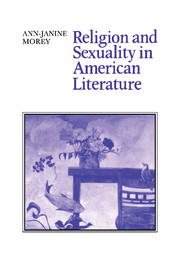Book contents
- Frontmatter
- Contents
- Acknowledgments
- Introduction
- 1 Body Language: Religion, Sexuality, and the Bioluminescence of Metaphor
- 2 The Stubborn Density of Desire: Religion and Sexuality in Nineteenth-Century Fiction
- 3 A Tradition of Divine Lechery: Men Write about the Ministry
- 4 A War of Words: Women Write about the Ministry. The Homiletic writers
- 5 Comfort to the Enemy: Women Write about the Ministry. The Parsonage Romance
- 6 The Fox in the Well: Metaphors of Embodiment in the Androcentric Imagination
- 7 Fatal Abstractions: Metaphors of Embodiment in the Gynocentric Imagination
- 8 Conclusion: Words Are Not the Thing Itself
- Appendix A The Homiletic Novels and Their Authors
- Appendix B The Parsonage Romances and Their Authors
- Bibliography
- Index
- Cambridge Studies in American Literature and Culture
1 - Body Language: Religion, Sexuality, and the Bioluminescence of Metaphor
Published online by Cambridge University Press: 25 March 2010
- Frontmatter
- Contents
- Acknowledgments
- Introduction
- 1 Body Language: Religion, Sexuality, and the Bioluminescence of Metaphor
- 2 The Stubborn Density of Desire: Religion and Sexuality in Nineteenth-Century Fiction
- 3 A Tradition of Divine Lechery: Men Write about the Ministry
- 4 A War of Words: Women Write about the Ministry. The Homiletic writers
- 5 Comfort to the Enemy: Women Write about the Ministry. The Parsonage Romance
- 6 The Fox in the Well: Metaphors of Embodiment in the Androcentric Imagination
- 7 Fatal Abstractions: Metaphors of Embodiment in the Gynocentric Imagination
- 8 Conclusion: Words Are Not the Thing Itself
- Appendix A The Homiletic Novels and Their Authors
- Appendix B The Parsonage Romances and Their Authors
- Bibliography
- Index
- Cambridge Studies in American Literature and Culture
Summary
In his now classic study of the sexual and pornographic underside of Victorian culture in The Other Victorians, Steven Marcus quotes physician William Acton, who noted that cases of extreme masturbation and insanity “chiefly occur in members of families of strict religious education. … Those who from this cause have become insane have generally… been of strictly moral life, and recognized as persons who paid much attention to the forms of religion…. In the acute attacks resulting from this cause… religion forms a noted subject of conversation or delusion.”
Marcus goes on to note that somehow religion seems connected with masturbation and insanity in Acton's observation, but “the connection goes unexplored - which can only lead us to conclude that the process by which causality is ascribed is often highly selective and tendentious.” Marcus, who is not especially concerned with the religiosexual connection, does not pursue the question of causality, and so we are left to ask, what, specifically, is selective or biased about Acton's observation – the connections between masturbation and insanity, or the larger relationship proposed between religion, sexual repression, and insanity? What trapdoor lurks beneath this glancing observation about the intertwining of religion and sexuality? Marcus's study was one of the first of a new generation of studies in the cultural history of sexuality, and the kinds of questions it raised are essentially the questions of this book. We will find, however, more plainly marked entrances and exits than trapdoors, and many more explicit statements of connection than those first postulated by Marcus.
- Type
- Chapter
- Information
- Religion and Sexuality in American Literature , pp. 15 - 42Publisher: Cambridge University PressPrint publication year: 1992



